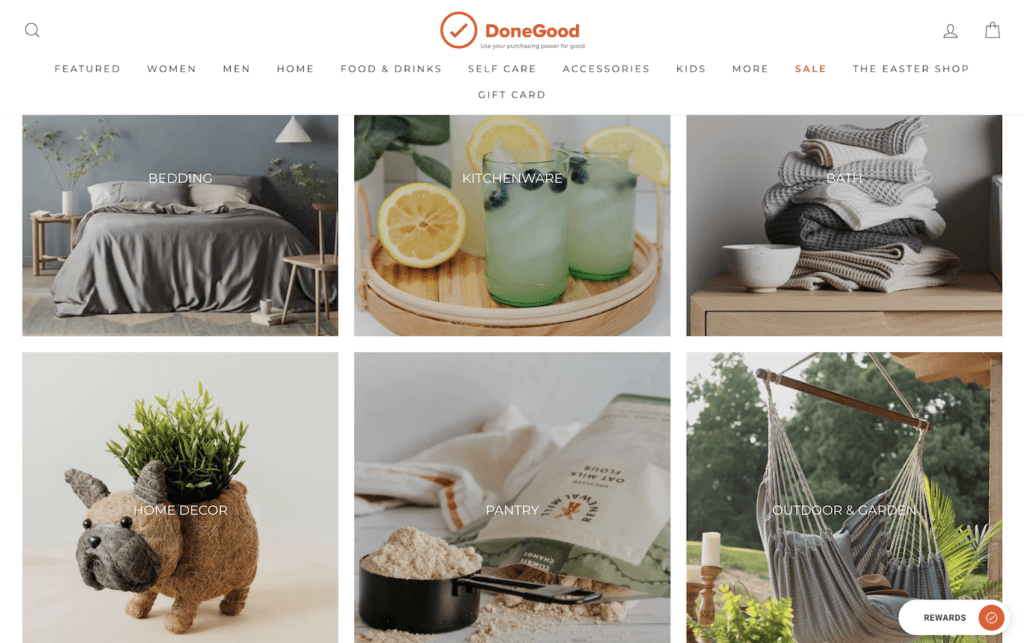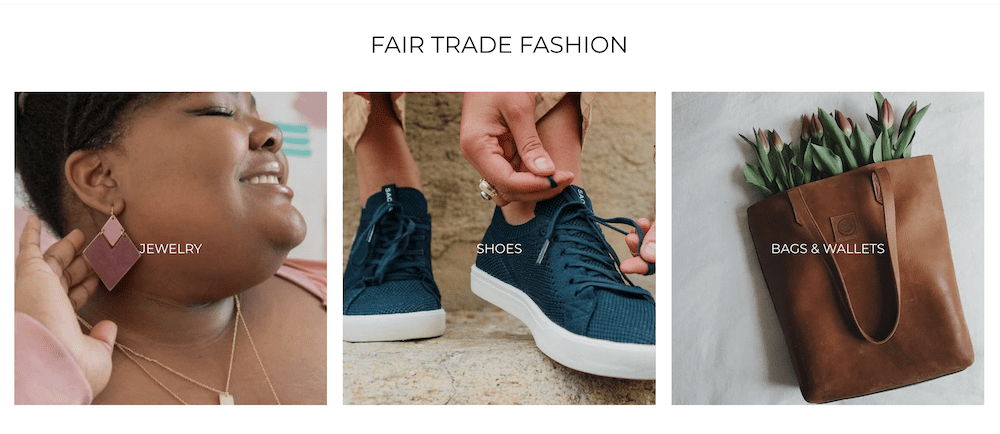For those not yet aware, DoneGood makes it easy for people to transform from “consumers” to “changemakers” every time they shop. Forbes called DoneGood “The Amazon for Social Good.”
It’s a top marketplace to find all sorts of items from clothing to bedding to jewelry to coffee to household cleaner and more—and also know that every one of their purchases does good for people and the planet.
The team at DoneGood screens every company that sells products on DoneGood to make sure they’re empowering workers, paying good wages, and using modern eco-friendly practices.
Americans gave $470 billion to charity last year. But we spent over 300 times more than that buying stuff!
If even a fraction of the dollars we all spend can also reduce poverty, fight climate change, support the social enterprise movement and help create the systemic change we need in our economy, the impact is huge.
Consumer demand is the force that will drive that transformation. DoneGood works to make it easy and more affordable for people to use their purchasing power to help accelerate the most important movement of our time.
Below is an interview with the founder of DoneGood, Cullen Schwarz.

Q: How do you and the team decide what brands can be on the DoneGood marketplace? Is there a certain criteria you look for?
A: We’re continuously scouring the planet for mission-driven, high-quality brands. We get a lot of tips through for great brands from DoneGood users through our website too. And now we’re well-known enough that we have new brands applying directly through our site every week.
We look for ethical and sustainable social enterprises that “do good for people and the planet.”
To us, “good for people” means empowering workers, paying living wages, investing in communities, and of course having production facilities free of trafficked or child labor and unsafe working conditions.
“Good for the planet” means using eco-friendly processes like facilities powered with renewable energy, or low-impact operations (like small batch, handmade production with a very low carbon footprint), using non-toxic, organic and/or recycled or upcycled materials, creating products built-to-last so there’s less consumption over the long run, and otherwise taking significant steps to fight climate change.
To determine a brand’s impact, we start by aggregating data from independent certifying organizations. This includes B Corps, trusted Fair Trade organizations, GOTS, the Rain Forest Alliance, and many others.
We combine these certifications with our own research, interviews with people at the company, and standards, asking brands to attest to various business practices and requiring that they demonstrate how they’re following through on those practices.
Our overarching principal is asking how our users would answer this question: “If everyone supported businesses like this one, instead of the big-name counterpart in the industry, would the world would be a substantially better place?”
If we think our users would emphatically say “Yes!” to that question, then we can feel good about adding that brand to the DoneGood family.
Q: For the last eight years, I’ve seen many impact marketplaces come and go, how has DoneGood been able to sustain itself over the years? How has the business model evolved?
A: We try to focus really hard on user experience and truly making people’s lives easier—the lives of conscious shoppers, and the lives of the people running DoneGood’s partner brands.
I think a lot of people starting impact marketplaces, or any social enterprises really, sometimes start with an “If you build it, they will come” mentality.
I think I was guilty of that when we first started out too. But I had a mentor at the incubator we started at say to me, “There are a lot of people starting the ‘Sustainable version of—fill in the blank.’ But if you’re going to be the ‘Sustainable -blank-, then you have to be really good at whatever the -blank- is.”
In other words, if we’re trying to be the Amazon for Social Good, then we have to work really hard to be good at being “an Amazon.” So we need to have a very wide and always growing selection of products on the site.
We need to make it easy to find what you’re looking for with really good category navigation and filters, really smooth UX overall.
We need rewards programs, subscriptions and automatic reordering, excellent customer service, and everything else the best e-commerce sites have.
And to get the word out we have to be really good at digital marketing. We have to be really good at being an e-commerce company overall—and have a positive impact.
To do that we need to really understand and love our customers, know what they really want, how they like to shop. And always keep learning how we can make our partner brands more successful.
That means continuously getting feedback, surveying and interviewing customers and partners, asking them things like what site improvements to prioritize.
Or, having learned that conscious consumers are often conscious people and therefore working for non-profits or in fields like healthcare or education, knowing that they’re on a budget, and so always working with our partner brands to offer discounts and sales when we can.
“All social entrepreneurs need to really be students of the industry we’re in.“
– Cullen Schwarz
We can’t just put some sustainable products on a site and assume it’ll all work out somehow. If you’re the sustainable-blank-, the social impact-blank, you still gotta be really, really good at being the -blank-.
Q: For future social entrepreneurs wanting to start some type of marketplace, what advice or tips would you give them?
A: Find a real market need, a way you’re solving a unique problem and pain point for consumers or businesses.
Try to find something truly additive to the movement you want to be a part of. I think it’s similar to starting a non-profit—there are a ton of non-profits already, and more forming every day, with many of them working on the same issues.
Ask some of these questions before you get started.
- Does it make sense to start another non-profit or social enterprise?
- Will your new non-profit or social enterprise do things differently than anyone else out there, or does having more non-profits or social enterprises that are all doing the exact same thing just spread resources thinner and reduce effectiveness and efficiency?
- Instead, are there ways to support existing non-profits or social enterprises that would be better than starting another one?
- Or can you start something that helps existing non-profits or social enterprises do their work more effectively and efficiently?
- Can you somehow get several non-profits or social enterprises to join forces in a way that makes a greater impact overall?
It’s important for the movement you want to support, and for the success of your social enterprise, to find something that’s truly not being done already.
Something that’s really additive, not clutter. Something innovative and unique that the world truly needs.

Q: What advice or tips would you give consumers who want to shop more consciously, what should they look out for to avoid greenwashing?
A: Ha well, I don’t want to be too obvious, but of course we think one great approach is to shop on DoneGood. We already did the work and the research so people can know that they can feel good about their purchases.
Beyond that, it’s helpful to look for trusted certifications from independent organizations.
Certified B Corps are certified for general environmental and social impact. Fair Trade International and Fair Trade USA are trusted fair trade organizations (for others Fair Trade certifications, it’s important to check on their certification criteria—some may be just be membership organizations that a business can pay to join, but there’s no other standards or criteria other than that).
We trust Forest Stewardship Council and Rainforest Alliance. GOTS Organic certifies organic materials and other social and environmental impact. Made Safe certifies non-toxic materials.
Leaping Bunny certifies cruelty-free. There are other good ones out there. When you see a new certification you don’t recognize, look it up and see what their standards are, and who’s behind it—a lot of industry groups are creating their own certifications now, and of course you can usually trust an independent certifying body more than one an industry creates to certify itself.
Finally, I think you can tell a lot by looking at a company’s claims closely. Sometimes they count on people to just accept claims quickly at a glance.
If a company just says words like “sustainable,” or just has branding that seems “earthy” or whatever, but provides no real details about what “sustainable” means, or they advertise “local” or something but don’t tell me much more, then I assume I still know nothing about the company’s impact.
Or some companies will say things like “70% of our products fit one or more of the following ecofriendly criteria!” Ok, so, first, they’re telling me that 30% of their products fit no criteria and aren’t sustainable at all. Strike one.
And then you look at the criteria they list, and some seem really good but a couple are really weak—well since they said their products only fit “one or more” of that list of criteria, you know it’s possible that a lot of the 70% only fit the one or two weakest criteria.
So then even from what they company is telling you, you know the products aren’t very good, or at least that you still don’t really know. A lot of the time it’s just about readying closely and thinking critically.
For those who are interested, we have a lot of resources on our blog at DoneGood.com. And we love taking questions at team@donegood.com!








